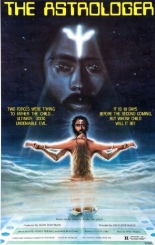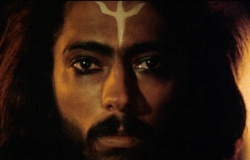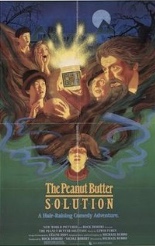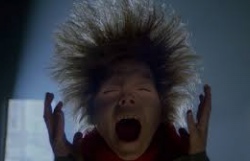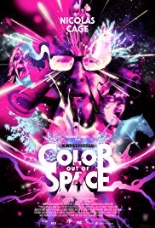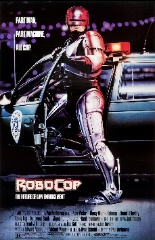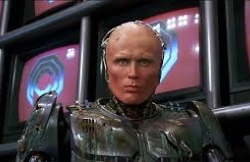
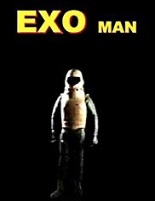 Remember the first-act origin of Iron Man, where Robert Downey Jr.’s Tony Stark builds a bulky metal outfit while being held prisoner in Afghanistan? Draw that section out to feature length, reduce the budget to equal a 12-year-old’s allowance and you have Exo Man, a superhero movie made the way they generally were in the 1970s: for prime-time network television.
Remember the first-act origin of Iron Man, where Robert Downey Jr.’s Tony Stark builds a bulky metal outfit while being held prisoner in Afghanistan? Draw that section out to feature length, reduce the budget to equal a 12-year-old’s allowance and you have Exo Man, a superhero movie made the way they generally were in the 1970s: for prime-time network television.
As wealthy old white men are wont to do, Kermit Haas (José Ferrer, The Swarm) instructs his goons to rob a bank so he can’t be outbid in the upcoming auction of the Gutenberg Bible. At said bank is college professor and physicist Dr. Nicholas Conrad (David Ackroyd, The Dark Secret of Harvest Home), who jumps into action as a good Samaritan and catches a fleeing robber. Naturally, this puts Conrad on the radar of Haas’ right-hand man (The Incredible Hulk’s Jack Colvin in women’s sunglasses); in a subsequent skirmish, Conrad not only gets clobbered, but paralyzed below the waist.
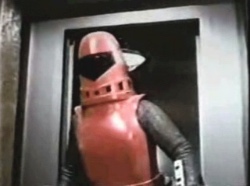 Good thing the doc’s been experimenting on how to alter the structure of matter — or something like that. All that matters is he succeeds — depicted through the not-so-special effects of magnets under the table — which enables him to “walk” again. To justify the title, he constructs a protective suit that makes him look like an unholy blend of a Shop-Vac and Conky from Pee-wee’s Playhouse, then goes out at night to fight crime, one sloooooow and lumbering step at a time. His Kryptonite? Toppling over.
Good thing the doc’s been experimenting on how to alter the structure of matter — or something like that. All that matters is he succeeds — depicted through the not-so-special effects of magnets under the table — which enables him to “walk” again. To justify the title, he constructs a protective suit that makes him look like an unholy blend of a Shop-Vac and Conky from Pee-wee’s Playhouse, then goes out at night to fight crime, one sloooooow and lumbering step at a time. His Kryptonite? Toppling over.
Like Iron Man, Exo Man gives us the claustrophobic, you-are-there shots of Conrad’s super-sweaty face within the unforgiving helmet. Whereas Tony Stark’s is top-o’-line and outfitted with a holographic dashboard, Conrad’s relies on switches and buttons, all marked using an old-school Dymo label maker (and one button misspelled as “MALFUNTION”). As an underdog of a telepic, Exo Man carries a similar ambling, DIY aesthetic and plays the material with utter sincerity. Shot as a pilot, it never went further than this and didn’t deserve to — unlike writer Martin Caidan and director Richard Irving’s previous team-up, The Six Million Dollar Man. —Rod Lott

